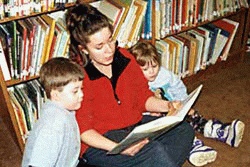Emergent Literacy at Chugiak Children's Services
By Kathleen Tessaro
"I never said 'put your books away,' " said Amber Wilson, Ashton's mother. "I let Ashton drag his books all over the house."
When Ashton was four years old, Amber decided it was time to enroll him in preschool. On a friend's recommendation, she enrolled him in the Chugiak Children's Services (CCS) Head Start program, a decision that changed her family's way of life.
 |
| Amber reads to her children Ashton and Hannah |
 |
The first thing Amber and her husband Stefan did was take advantage of Head Start's open door policy; they started showing up in the classroom during the day. They become active parent volunteers. Before long they discovered the more involved they got in Ashton's education the better he seemed to do. "He would be so proud to show us his work," Amber said.
Soon Amber joined the Parent Center Committee, and began helping choose activities for Head Start's educational "Family Fun Nights." When she started going to monthly parent workshops, Amber found out about emergent literacy, a philosophy that parents can foster literacy by creating conditions for it to grow and thrive in their children, starting right in their own home. Psychologists, educators, linguists, and anthropologists believe the development of literacy begins early in life and takes place within each child. Emergent literacy, the philosophy used at Head Start, states each child is born with their own natural learning ability, and it emerges under the right conditions. This excited Amber.
One way to foster this emergence is by making reading materials readily accessible. In other words, "littering the house with print." And that's what the Wilsons started to do. Amber and Stefan put children's books and magazines every place adult books and magazines were in their home: in the bathroom, on the coffee table, in the car, and next to the bed.
Early on, Amber and Stefan formed the habit of reading to Ashton every night before bed. They knew the bedtime readings were enjoyable for him and they hoped he would someday continue them on his own. But emergent literacy taught them never to mandate bedtime, or any other time, as a "required" reading period. The idea is to make reading a desired activity, not a duty. "It should be fun and not work," said Amber. "Ashton is now seven years old and to this day he will pick up a book to read every night before bed."
Head Start promotes placing writing implements in various places, such as pens, pencils, notepads, envelopes, and paper. One Head Start teacher, Kim Ulrich, insists pencils serve literacy better than crayons or markers. "Put out markers and children will draw, put out pencils and they'll write," Ulrich says. Ashton has a desk in his room that is kept stocked with writing materials. Any time he desires he can pull out paper and pencil.
Ashton's success with the emergent literacy program led Amber to volunteer for CCS Head Start as part of the AmeriCorps VISTA program and to teach her own parent workshop. One thing she stresses to other parents is to build their child a private library. "It could be something as simple as building a book shelf out of a board and a couple of blocks," says Amber. "The important thing is it makes books accessible and it gets parents and kids working together. Our shelf contains Ashton's favorite toys as well as his books. It is a special spot. That's important too. It has to be someplace special, a place the child can be proud of," she says.
Another thing Amber tells people in her workshops is that children learn by example. "If they see you reading they will want to read too," she said. "Make books, magazines, paper, pens available for your kids. And let them be creative!"
Amber believes the emergent literacy techniques she learned through Head Start helped Ashton to be ready for public school. "I know this practice, along with my and my husband's involvement in Ashton's education, has helped him love books and has prepared him tremendously for Kindergarten on a social and literary level. I see how he's gained independence and confidence. Now, at seven, he loves school. He's doing well with writing and learning to read."
Ashton's four-year-old sister, Hannah, is following in his footsteps, starting on her own emergent road to literacy. "It's Hannah's turn to have the same wonderful experiences and get prepared for Kindergarten," Amber says.
To read more about Head Start, visit their web site.




